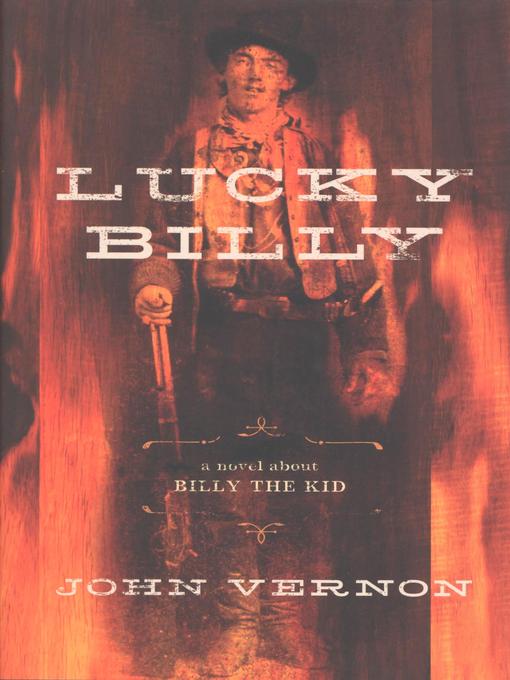
Lucky Billy
- اطلاعات
- نقد و بررسی
- دیدگاه کاربران
نقد و بررسی

September 15, 2008
Billy the Kid rides again in this literary retelling of his legendary and bloody career. The story begins with his bold escape from the Lincoln, N.Mex., jail in April 1881, then flashes back to his capture by former friend Sheriff Pat Garrett. The narrative travels back and forth between Billy’s final escape and his earlier role in the Lincoln County war. Although the novel touches on familiar incidents in Billy’s life, it also hews close to historical research in showing how the war for control of Lincoln County between the Murphy-Dolan Irish merchant ring and upstart English rancher/merchant John Tunstall was a continuation of Anglo-Irish enmity. After Tunstall is murdered, Billy goes gunning for members of the Irish ring. A pardon from New Mexico territorial governor Gen. Lew Wallace comes to naught, and the familiar story grinds to its inevitable end. Although Doyle makes dramatic use of research into Anglo-Irish tensions in the Old West, the Billy presented here is too one-dimensional to make us understand why his legend continues to hold sway in the popular imagination 127 years after his death.

October 15, 2008
A compelling image of the legendary outlaw 's flawed, fascinating character gradually takes shape in this latest from veteran historical novelist Vernon (Creative Writing/Binghamton Univ.; The Last Canyon, 2001, etc.).
Beginning with a description of the famous "tintype " illustration of teenaged William Bonney (who sometimes toted his hated stepfather 's surname: Antrim), Vernon zeroes in on several key years and episodes in Billy the Kid 's life. We see him first in 1881, when likewise-legendary Sheriff Pat Garrett has captured and jailed the Kid and his fellow mercenaries, who had fought during the New Mexico territory 's notorious Lincoln County War on the side of honorable English landowner John Tunstall against Irish-American cattle barons led by murderous rancher James Dolan. It sounds a mite complicated —and is, for some pages, as the narrative whipsaws backward and forward. The well-meaning Tunstall 's story unfolds in letters to his parents and financial backers; Billy 's quick conversion to crime and violence provides an escape from inhibiting memories of his unhappy boyhood and his beloved mother 's early death; then Billy 's final days take center stage. Vernon 's mastery of period detail and cowboy culture is rich and convincing; for example, we learn that the word "rustler " is a corruption of "wrestler. " But the time shifts create confusion as well as propulsive narrative energy, and it 's a chore sorting out imperfectly differentiated sidekicks, gunslingers and passing strangers. Fortunately, the novel 's shapely arc efficiently establishes Billy 's exigent and defensive morality: "Forget good, I 'm after justice …Alls I ever did was shoot a few people. " And there 's real pathos in the working out of his destiny, perfectly encapsulated in the hired gun 's foreknowledge that "his [own] bullet would follow him all his life, taking every turn he took. "
Don 't believe the critical canard that the Wild West tale is dead —this novel proves again that it ain 't even seriously wounded.
(COPYRIGHT (2008) KIRKUS REVIEWS/NIELSEN BUSINESS MEDIA, INC. ALL RIGHTS RESERVED.)

November 15, 2008
Vernon (The Last Canyon, 2001) starts his latest literary western off with a bang: on April 28, 1881, in Lincoln, New Mexico, the outlaw called Billy the Kid makes his infamous jailbreak, shooting dead two sheriffs deputies and fleeing, still in chains, by horse into the Capitan Mountains. Alternating chapters looking back to how his legend began center on the Lincoln County War, a blood-soaked feud with no innocent bystanders. In 1877 an enterprising young Englishman named John Tunstall dares open a mercantile store that challenges local Irishmens monopoly and pays with his life. Teenage Billy, one of his loyal hired guns, falls in with a band determined to avenge Tunstalls murder. The lawlessness of the period, in which criminality can mean simply being on the wrong side of corrupt officials, is evoked to perfection, scenes of unremitting brutality playing out against the harsh beauty and shifting colors of the landscape. Billy, both amused and bemused by his unlikely celebrity, emerges as an accidental leader forced to survive by violence until his time inevitably runs out.(Reprinted with permission of Booklist, copyright 2008, American Library Association.)




دیدگاه کاربران